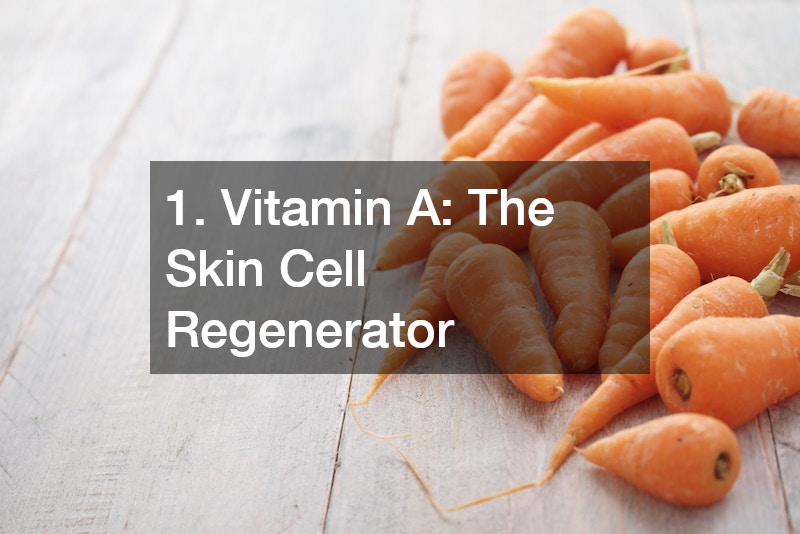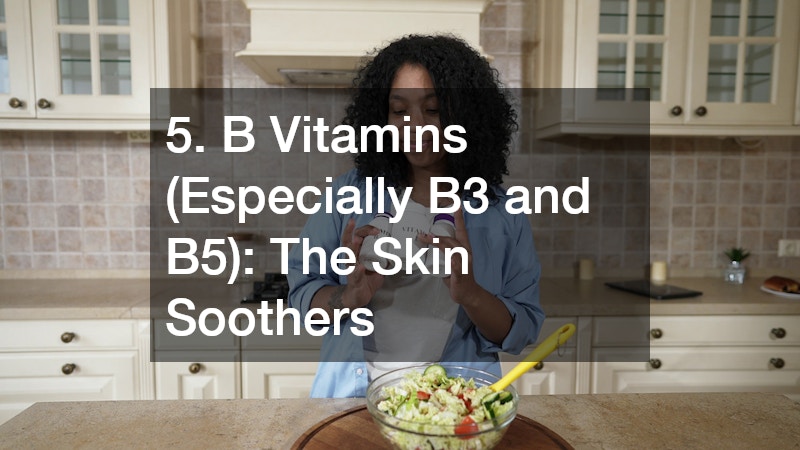Dry, flaky, or irritated skin can be more than just a seasonal annoyance—it’s often a sign that your body lacks the essential nutrients it needs to maintain healthy skin. While moisturizers and oils can help manage symptoms on the surface, the root of dry skin often lies deeper, at the nutritional level. That’s where vitamins come in. Certain vitamins help the skin retain moisture, repair damage, and strengthen its barrier.
In this article, we’ll explore the top 5 vitamins for dry skin, how they work, and where to get them—naturally or through supplements.
Why Vitamins Matter for Skin Hydration
Your skin is your largest organ, and like any other part of your body, it needs proper nourishment to function well. Vitamins play critical roles in cell regeneration, collagen production, inflammation control, and moisture retention. A deficiency in even one essential vitamin can result in dry, tight, or scaly skin.
Many people rely solely on external skincare routines without realizing that internal health directly affects the skin’s appearance. By supporting your body with the right vitamins, you can help restore hydration, improve texture, and maintain a healthy glow naturally and sustainably.
1. Vitamin A: The Skin Cell Regenerator

Vitamin A is crucial for skin health. It promotes cell turnover and helps the skin form and maintain a strong barrier against environmental damage. A deficiency in vitamin A can result in rough, dry, and peeling skin, especially on your arms, legs, and face.
Benefits of Vitamin A for dry skin:
- Encourages healthy skin cell production
- Improves skin texture and tone
- Strengthens the skin barrier
Natural sources of Vitamin A:
- Sweet potatoes
- Carrots
- Leafy greens (spinach, kale)
- Liver and egg yolks
If you’re considering supplementation, look for retinyl palmitate or beta-carotene. Always consult with a healthcare provider first, as high doses of vitamin A can be toxic.
2. Vitamin E: The Moisture Lock
Vitamin E is a fat-soluble antioxidant that protects the skin from oxidative stress and helps retain moisture. It’s often found in skincare products and oral supplements because of its strong moisturizing properties.
Why Vitamin E helps with dry skin:
- Seals cracks in the skin’s barrier
- Soothes inflammation
- Prevents water loss
Vitamin E-rich foods:
- Almonds and sunflower seeds
- Avocados
- Olive oil
- Spinach
Topical vitamin E oil can be used directly on dry patches. For an added moisture boost, consider pairing it with the best oil for dry skin, such as argan or jojoba oil, both of which are rich in vitamin E.
3. Vitamin D: The Sunshine Vitamin That Supports Skin Health
Many people are deficient in vitamin D, especially those who spend a lot of time indoors. This vitamin plays an important role in skin cell growth and repair and supports the skin’s immune system.
How vitamin D combats dry skin:
- Supports skin renewal
- Reduces inflammation
- Enhances skin barrier function
Sources of Vitamin D:
- Sunlight (about 15 minutes daily)
- Fatty fish (salmon, sardines)
- Egg yolks
- Fortified dairy or plant-based milk
If you have a vitamin D deficiency, supplements can help. Choose vitamin D3 for better absorption, especially during winter months when sun exposure is limited.
4. Vitamin C: The Hydration Helper
Vitamin C is best known for boosting immunity, but it’s also a hydration hero. It supports collagen production, which helps retain moisture and elasticity in the skin.
Benefits of Vitamin C for dry skin:
- Promotes collagen synthesis
- Improves skin texture and brightness
- Fights free radical damage
Foods rich in vitamin C:
- Citrus fruits (oranges, lemons)
- Bell peppers
- Strawberries
- Broccoli
Topical vitamin C serums are widely used in skincare routines. For dry skin, use it alongside hyaluronic acid or a hydrating moisturizer to prevent any irritation.
5. B Vitamins (Especially B3 and B5): The Skin Soothers

Keyword: Vitamins for Dry Skin
B vitamins, especially niacinamide (B3) and pantothenic acid (B5), are essential for maintaining skin softness and hydration. They help rebuild the skin barrier and improve its ability to retain water.
What B vitamins do for dry skin:
- Reduce redness and flakiness
- Support skin healing and elasticity
- Improve hydration at the cellular level
Top food sources of B vitamins:
- Whole grains
- Eggs and dairy
- Legumes
- Lean meats
Niacinamide is also found in many serums and creams that soothe dry, irritated skin. It’s well-tolerated and a must-have in any dry skin routine.
How to Know If You’re Vitamin Deficient
While dry skin can result from harsh weather or dehydration, long-term dryness may be a sign of a nutritional imbalance. Signs of vitamin deficiency that affect the skin include:
- Persistent dryness or flakiness
- Cracked heels or lips
- Rough patches that don’t heal
- Frequent skin irritation
If these symptoms sound familiar, it’s worth discussing with a dermatologist or nutritionist. Blood tests can help pinpoint deficiencies, and a tailored diet or supplement plan can bring relief.
Final Tips to Boost Vitamin Intake for Healthier Skin
To support your dry skin from within:
- Eat a balanced diet rich in colorful fruits, vegetables, and healthy fats
- Stay hydrated—vitamins need water to function
- Use topical skincare products that include vitamin-based ingredients
- Consider multivitamin supplements if you have dietary restrictions
By nourishing your body with the right vitamins for dry skin, you can achieve lasting results that go beyond surface-level treatments.
